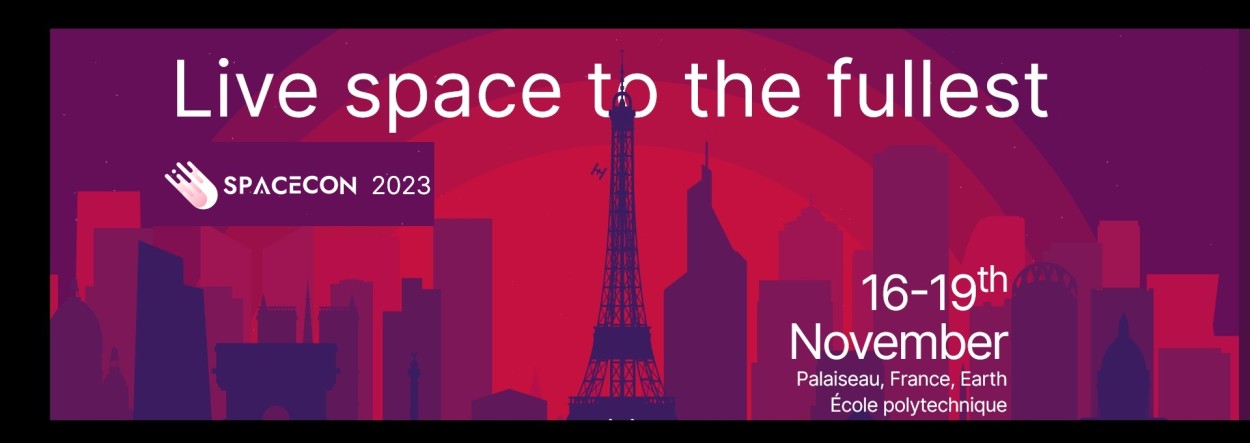École Polytechnique hosts the SpaceCon 2023 event

The third edition of SpaceCon takes place from November 17 to 19 at École polytechnique, which has a special relationship with this event dedicated to space, its players and its exploration.
Created by three X alumni - Arnaud Gallant (X2013) and two École Polytechnique PhD graduates Ruben di Battista and Pierre Cordesse, SpaceCon features a day of conferences, activities including astronomical observations, and a competition based on the video game "Kerbal Space Program", in which players create and manage their own space program.
The event is supported by the AstronautiX student association, the Space Centre of École Polytechnique (CSEP) and the "Space : Sciences and space challenges" sponsorship.
"École Polytechnique’s ecosystem is actively involved in space exploration," emphasized Laura Chaubard, the School’s Director General and Acting President, in her opening speech.
"In the new space race, École Polytechnique, an institution of research, education and innovation, is forging public-private partnerships to support French and European sovereignty in the space industry," she added.
Laura Chaubard pointed out that several of X's 23 laboratories are helping to push back the frontiers of knowledge and understanding of space.
The Leprince Ringuet laboratory (LLR, CNRS, École polytechnique - Institut Polytechnique de Paris) is part of the HESS (High Energy Stereoscopic System) experiment, an instrument born of international collaboration to detect the traces produced by gamma rays, when the particles they produce reach the Earth's atmosphere.
Researchers at the Dynamic Meteorology Laboratory contribute to ESA and CNES missions that send greenhouse gas and climate observation satellites into space to fine-tune models and better anticipate climate change.
Researchers at the Plasma Physics Laboratory (LPP, CNRS, École Polytechnique - Institut Polytechnique de Paris, Observatoire de Paris, Sorbonne University, Université Paris-Saclay) are involved in several space missions, contributing their expertise in spectroscopic instruments that can be flown on satellites, some studying the sun, others Mercury. The LPP has also helped redefine the means of reaching space through its work on plasma propulsion, which has given rise to a start-up company, ThrustMe.
The XCAN program, a new generation of high-power lasers, launched by Nobel Prize winner Gérard Mourou, Professor Emeritus at École Polytechnique, and carried out by the Laboratory for the Use of Intense Lasers (LULI, CNRS, Ecole Polytechnique - Institut Polytechnique de Paris, CEA, Sorbonne University). This laser has multiple objectives, not least to help clean up space by removing more of the objects orbiting our planet and threatening future space missions. By concentrating laser light, LULI researchers are also able to reproduce astrophysical phenomena in the laboratory, to better understand space phenomena.
A NEW SHARED LABORATORY
The School has just launched a new joint laboratory with aerospace equipment manufacturer Safran, COMHET, on the design and development of new-generation Hall-effect thrusters.
On the education front, Laura Chaubard points out that the "Espace : Sciences et Défis du Spatial" sponsorship program, in partnership with Thales Alenia Space and ArianeGroup, offers a wide range of opportunities for X students.
Also supported by CNES, this program includes a specialization track open to third-year students, launched in 2019 on "Space Sciences and Challenges" and preparing for technical professions in this field.
The "Space Sciences and Challenges" program includes the Ecole Polytechnique Space Center (CSEP), created in 2010 to train tomorrow's aerospace professionals. Students in the specialization program have direct access to the CSEP. It is a meeting place for students, engineers, professors, researchers and space agency staff to develop Ecole Polytechnique's space projects around two axes: rockets and satellites with the X-rocket project and the launch of one of the first two French student satellites, X-CubeSat, put into orbit from the International Space Station on May 17, 2017, with the help of X laboratories.
X-CubeSat recovered remote sensing data on the satellite's "health", such as temperature or voltage. Following the success of X-CubeSat, an even more ambitious project involving 50 students will be launched at the end of 2024. Called IonSat and developed in partnership with ThrustMe, it involves the design, launch and maintenance in low orbit (300 km altitude) of an electrically propelled nanosatellite powered by iodine.
Finally, Laura Chaubard pointed out that École Polytechnique nurtures the French space innovation ecosystem and contributes to a more sustainable space.
In addition to ThrustMe, which designs miniature thrust systems for small satellites, helping to make this industry economically and environmentally sustainable, ShareMySpace, founded by Romain Lucken (X2021), seeks to tackle the issue of space debris; while Exotrail, led and co-founded in 2017 by David Henri (X2013) develops a propulsion system for nanosatellites.
 Support l'X
Support l'X